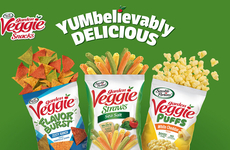
Laura McQuarrie Highlights Four Winning Ethical Marketing Campaigns
Laura McQuarrie — August 7, 2015 — TH Video
References: youtube
With many health-conscious consumers treating food as a means to prevent illness and promote wellness, brands and organizations are making use of ethical marketing to communicate a strong stance on food transparency issues. As it becomes appealing for brands to sell products that are healthy, consumers need extra assurance that what they are eating doesn't include GMO ingredients or involve unethical farming, especially since there are so many misleading food labels.
These four examples of ethical marketing take the form of interactive billboards, emotive storytelling commercials and campaigns that help to explain the quality, ingredients, origins or processing that a food item undergoes on the way from a farm to one's table.
At the same time the integrity of food is being explored with initiatives like these, there is a general desire for marketing in other industries to be just as transparent and straightforward.
These four examples of ethical marketing take the form of interactive billboards, emotive storytelling commercials and campaigns that help to explain the quality, ingredients, origins or processing that a food item undergoes on the way from a farm to one's table.
At the same time the integrity of food is being explored with initiatives like these, there is a general desire for marketing in other industries to be just as transparent and straightforward.
Trend Themes
1. Ethical Marketing - As more consumers become health-conscious, ethical marketing is becoming increasingly important as a means to add transparency to food products.
2. Food Transparency - Consumers require extra assurance that food is free from GMOs and unethical farming, making food transparency a trend to watch for disruption opportunities.
3. Interactive Advertising - Innovative advertising campaigns like interactive billboards and emotive storytelling commercials are disrupting the marketing industry and delivering engaging and ethical experiences.
Industry Implications
1. Food Industry - The food industry can embrace transparency and ethical marketing practices to leverage health-conscious consumer trends and build trust with customers.
2. Marketing Industry - There is a general desire for all industries, including marketing, to increase transparency and embrace ethical practices, creating opportunities for disruptive innovation in advertising and brand messaging.
3. Agriculture Industry - The agriculture industry can lead the way in ethical farming practices and sustainable sourcing, capitalizing on consumer demand for transparent supply chains and eco-friendly products.
1.5
Score
Popularity
Activity
Freshness















